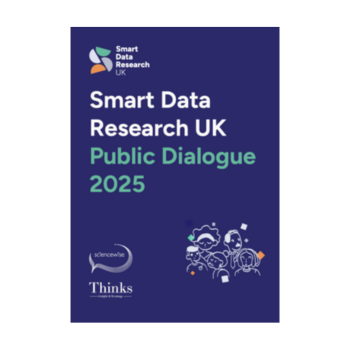Building trust
Our approach to public engagement and responsible data use
At Smart Data Research UK (SDR UK), building public trust is central to our mission of unlocking the power of smart data to improve lives. We believe that meaningful engagement with the public and transparent, ethical data practices are essential foundations for this trust.
Learn more about our mission and objectives.
Our commitments
SDR UK’s commitments to building trust are:
To be open and transparent about our work and to involve the public as much as possible
We actively engage with the public to understand their perspectives on smart data research and incorporate these insights into our work. This approach ensures that our activities align with public values and expectations.
To ensure the highest standards of ethical conduct and responsible data practices
Together with our data services and wider networks of partners, we ensure data is acquired and governed in a trustworthy way, with appropriate levels of privacy and full legal compliance.

Public dialogue report
In 2024, we conducted our first comprehensive public dialogue to understand people’s hopes, concerns, and expectations regarding smart data research.
Working with public engagement specialists Sciencewise and facilitated by Thinks Insight & Strategy, we engaged 72 diverse participants across five UK locations (Belfast, Gateshead, Inverness, London, and Newport) through a series of workshops held over four weeks between September and October 2024.
In May 2025, we published the Smart Data Research UK Public Dialogue 2025 report.
What we learned from our public dialogue
Key findings
1. Growing enthusiasm with understanding
While participants began with limited knowledge of smart data research and some initial scepticism, their enthusiasm grew significantly as they learned more about its potential to drive positive change.
2. Focus on real-world impact
Participants wanted smart data research to tackle major national challenges including social inequality, health, economic issues, and infrastructure. They valued both the scale (number of people affected) and size (potential benefit) of outcomes.
3. Importance of data quality and inclusivity
High-quality and inclusive data were seen as vital for ensuring research benefits all communities fairly. Participants expressed concern about how flawed or incomplete datasets could lead to biased outcomes.
4. Private sector collaboration
While initially sceptical of private sector motivations, participants became more comfortable when public benefit was clearly prioritised and safeguards were explained.
5. Security concerns addressed by safeguards
Learning about existing frameworks like the Five Safes significantly increased participants’ comfort with smart data research, shifting focus from general security worries to specific oversight mechanisms.
6. Desire for meaningful public involvement
Participants valued the opportunity to shape smart data research priorities and definitions of public benefit, while recognising that technical matters might be better left to experts.
Core values
Throughout the dialogue, four key values emerged as drivers of public trust in smart data research:
Knowledge
- Active information sharing about smart data research work and impact
Transparency
- Openness about data collection, sharing, and use
Oversight and accountability
- Robust implementation and monitoring of safeguards
Public Benefit
- Demonstrable positive change in people’s lives
Our response
As Director Joe Cuddeford notes in his foreword to the report:
“As we move forward, we’re implementing several concrete actions. We’re clearly articulating the robust data governance frameworks we use – like the Five Safes. We are establishing transparent oversight mechanisms and creating clear channels for public involvement. We’re developing ways to explain our work (including technical concepts) that resonate more effectively with the public.”

Read the report
To read or download the full report, please go to Public Dialogue report.
Public engagement oversight group
Our public engagement oversight group includes people from a range of fields and perspectives, all with an interest in the use of smart data for research that will benefit society. They are:
- Chair – Professor Alison Park, Deputy Executive Chair, Economic and Social Research Council (ESRC)
- Nick Bailey, Director, Urban Big Data Centre, University of Glasgow
- Stephanie Borthwick, Senior Policy Adviser, Which?
- Tim Davies, Research Director, Connected by Data
- Javier Ruiz Diaz, Digital Policy Consultant
- Colin Griffiths, Policy Manager, Citizens Advice
- Roger Halliday, CEO, Research Data Scotland
- Teodora Kaneva, Head of Infrastructure, techUK
- Jared Keller, Independent Consultant
- Yves-Alexandre de Montjoye, Associate Professor, Imperial College London
- Andy Morris, former Chief Data Officer, Walgreens Boots Alliance
- Sofi Nickson, Head of Research, Office for Statistics Regulation
- Kathy Peach, Director of the Centre for Collective Intelligence Design, NESTA
- Alison Preston, Head of Research: Making Sense of Media, Ofcom
- Octavia Field Reid, Associate Director, Ada Lovelace Institute
- Fay Skevington, Digital Strategy, AI in Education, Department for Education
- Pete Stokes, Director of Platform Development, OpenSAFELY, University of Oxford
- Richard Syers, Principal Policy Adviser, Information Commissioner’s Office (ICO)
- Ros Williams, Senior Lecturer in Digital Media and Society, University of Sheffield
PEDRI
We proudly support the Public Engagement in Data Research Initiative (PEDRI). PEDRI is a sector-wide partnership bringing together organisations that work with data and statistics to generate insights that can inform policy and practice.
The goal is to collaborate on establishing and driving forward best practice for public involvement and engagement (PIE) with data research, to bring the views of the public to policymakers and data holders in a more meaningful way.
Get involved
To learn more about future engagement opportunities or to share your thoughts on smart data research:
- Email us at smartdataresearch@ukri.org
- Sign up for the Smart Data Research UK newsletter to receive updates on our work
- Follow us on LinkedIn, Bluesky, and YouTube
